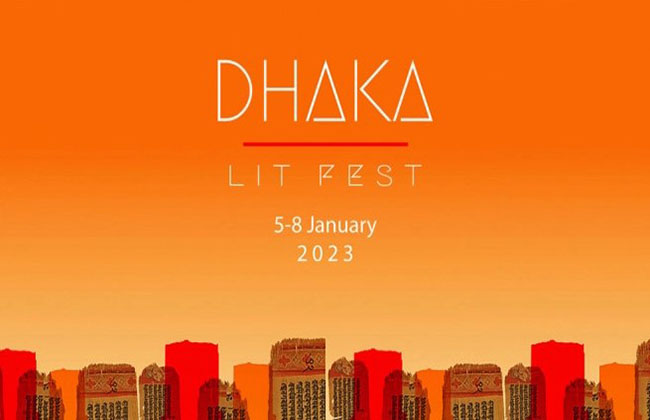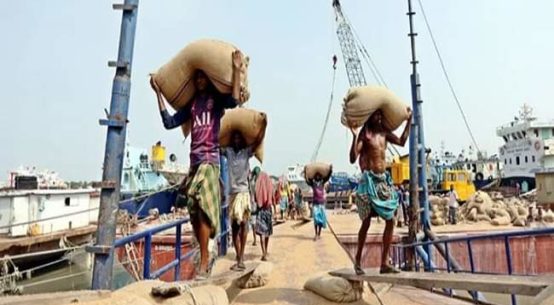
The Dhaka LitFest 2023 held at Bangla Academy from 5-8 January was crowded with tens of thousands of enthusiasts braving the cold wave which swept through Bangladesh.
The English and Bangla literature, pressing issues, and serious themes – like climate change were discussed, debated and of course lots of fun, art, music and film shows and adda.
The Adivasi human rights activists, writers, story-telling, poets, filmmakers and teachers came from among Garo, Chakma, Rakhine, Mro, Santal and Tripura. While the First Nation community from Australia and a Rajbangshi writer from West Bengal, India also participated in the LitFest events.
Several guest speakers confided that they were requested (not warned though) to avoid sensitive political jargon and not to mention the Bangalee settlers. The encroachers from the flood plains were resettled and are looked upon them as trouble-makers. The encroachers have destabilised the climate of security of the ethnic nationalities – especially in the Chattagram Hill Tracts and regions where the Adivasi population were living for centuries in Bangladesh.
Despite the limitation, most of the Adivasi leaders and speakers lamented tons of problems of humiliation, suffering, agony and pain they faced in everyday life which becomes difficult to protect their culture, tradition and heritage.
The poets and writers admitted that no publishers are eager to publish their books. The first reaction was that as they are not Bangalee of course and may not have studied Bangla well, therefore the manuscripts would be loaded with spelling and grammatical errors, which would be difficult for publication.
In addition, the publishers argue that as the Adivasi community population is very small and the average educational percentage is very small, therefore the readership would be very less. Thus there is no market for those books and the publisher squabble that they would incur financial losses.
Neither the Chattagram Hill Tracts Development Board nor the cultural institutes for ethnic nationalities in Bandarban, Cox’s Bazar, Khagrachari, Moulvibazar, Netrokona, Rajshahi and Rangamati publishes their literary works. The National Book Centre does not promote the works of literature of the Adivasi.
Similarly, the Adivasis in Bangladesh are fast losing their culture and language with the encroachment of Bangalee settlers in their neighbourhoods and the local people living there for centuries were uprooted and had to migrate further deep into the hill forests.
Sanjeeb Drong, general secretary of Adivasi Forum, poet Parag Ritchil, human rights defender Ilira Dewan, filmmaker Aung Rakhine, ethnic food entrepreneur Priyanka Chakma and writer Younguang Mro, Bangla teacher Bipam Chakma, Mrittika Chakma and others could not give a rosy picture of the life of ethnic nationalities in Bangladesh.
Most of the speakers did not hesitate to say that they are facing challenges in every step of their professions and even as a student who is pursuing higher education.
Sometimes Priyanka Chakma is shocked when her customers at Hebaang restaurant, which serves cuisines of the Hills in Begum Rokeya Sharani, Mirpur. They ask whether they also cook snakes, frogs, lizards, and dogs.
She smiled and said that is the perception of the majority of people in Bangladesh.
Another writer Mrittika Chakma said most government officials posted in the Chattagram Hill Tracts believe it was a punishment posting. The senior bureaucrats threaten their junior officers that they would be transferred to the Hills if their performance does not improve.
He sighed and said it’s a pity that such is the attitude which dominates within the government administration.
Filmmaker Aung Rakhine’s previous documentary remains frozen with the Film Censor Board and did not issue a certificate for showing the feature film. He was also summoned by a security agency to explain the meaning of some shots in the celluloid, which they said undermines the security force’s role in the Hills.
Aung understands that his present project to make a documentary on the life, culture, tradition and festivals of the Mro nationality in Bandarban would not hurt anybody’s feelings.
A speaker at the raised platform was hesitant but recovered and said that during the liberation war, the narratives of national minorities are not found in textbooks are in the media.
Whereas, several thousand recruits from the Garo, Santal, Manipuri, Chakma, Tripura and Marma nationalities along with other Adivasis joined the Mukti Bahini and fought the marauding soldiers of Pakistan and some have received gallantry awards for their contribution to the liberation war.
Saleem Samad, is an award-winning independent journalist, media rights defender, recipient of Ashoka Fellowship and Hellman-Hammett Award. He could be reached at <saleemsamad@hotmail.com>; Twitter @saleemsamad


